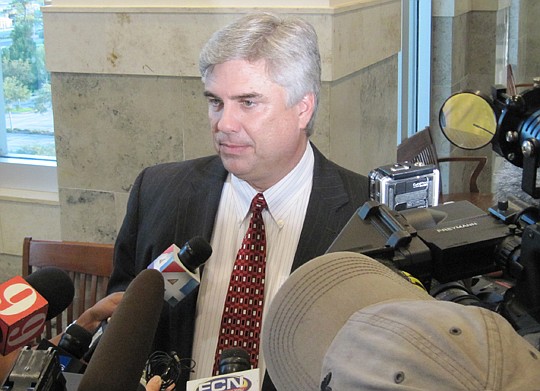
For a half-dozen years, Internet cafes operated in the gray area of the law.
A gray area that the Legislature talked about but failed to address twice before the massive Allied Veterans of the World gambling and racketeering busts in March.
A gray area that led communities, including Jacksonville, to pass local ordinances to regulate the businesses.
A gray area that the judge wouldn't let jurors hear about during the four-week trial of Jacksonville attorney Kelly Mathis, accused of being the mastermind behind a $300 million gambling operation that started in 2007.
Jurors deliberated about 15 hours over two days before convicting Mathis on Friday night of 103 gambling-related charges. Mathis, 50, could spend the rest of his life in prison.
"We were precluded from (introducing) all the legislative efforts that have occurred on the state and local level over the last six years to clarify this gray issue," Mathis said after the verdicts were read in Sanford.
But for statewide prosecutor Nick Cox, there was no gray about the legality of the businesses.
"It makes our system look bad when you have an attorney doing something like this, so it's not anything to celebrate," he said Friday. "… You can't use the practice of law as a shield."
Cox said the verdict sends a message that "people will be held accountable."
Rod Sullivan, a law professor at Florida Coastal School of Law, said attorneys who represent clients with a gambling interest need to be concerned their advice may now cause them great exposure.
Defense attorney Mitch Stone called the potential precedent set by the case "very disturbing."
Mathis agreed, saying, "Attorneys are on trial in this case. And attorneys all over the nation need to be very afraid when six years after you give legal advice, somebody disagrees with that legal advice and they can convict you of a crime."
Sullivan said when the Internet cafes surfaced, he spent time researching the issue. The cafes sold Internet time and gave away sweepstakes entries that had to be checked on machines that resembled slot machines.
Sullivan said he determined the businesses "may fall under the exception for sweepstakes."
"My impression was that this is very much an unsettled area of the law," he said.
Sullivan said he was surprised Judge Kenneth Lester didn't let Stone present evidence to the jury that the businesses may have met that exception.
In addition to jurors not hearing about the state and local attempts to regulate the businesses, they also didn't get to hear from several lawyers and public officials who said they believed the cafes were operating legally under the state law in place at the time.
And they didn't learn the Legislature made the cafes illegal after the Allied Veterans arrests.
Stone, who is planning to appeal the verdicts, said that information "really went to the heart of our defense."
"If we get another chance, it will be with that evidence," Stone said of the possibility of the appellate court granting a new trial.
He said a juror contacted him after the verdict and said the information would have been important if the juror had known it.
Despite not being able to present the evidence, Stone said the verdict was "shocking," adding that "most court watchers" said they expected there would be a "pretty fast not guilty" verdict.
Throughout the case, Stone said Mathis was only providing advice and wasn't involved in the operation of the cafes.
"Lawyers cannot provide legal advice based on subjective opinions of what one segment of society may think should be illegal," Stone said. "Lawyers can only interpret the laws that are currently on the books. That is what Mathis did and in our view he was correct and for six years that law never changed."
Sullivan said the amount of money prosecutors said Mathis earned lends credence to the contention that Mathis was only providing advice.
The professor said he was struck by prosecutors' assertion that Mathis was the mastermind of a $300 million scheme but was paid only $6 million to $7 million.
"If he's the mastermind," Sullivan said, "he's not very good at it. I think it (the amount Mathis was paid) speaks toward the fact he was providing advice."
Mathis was among 57 people arrested in March. So far, about 30 people have either agreed to deals or had their charges dropped.
Key defendants who won't be serving jail time under deals reached with prosecutors are former Allied Veteran leaders Jerry Bass and Johnny Duncan and software developer, Chase Burns.
Officials contend Allied Veterans leaders touted the business as a way to help veterans' charities. The dozens of cafes gave the charities about 2 percent of the money brought in.
Cox said a lot has happened since the arrests.
"Businesses have been closed. Properties have been forfeited. The law's been changed (by the Legislature)," he said.
In addition, Jennifer Carroll resigned as lieutenant governor the day she was questioned by Florida Department of Law Enforcement investigators about her ties to Allied Veterans.
Her consulting company did work for Allied Veterans and she appeared in a commercial for the group.
Cases still to be settled include Nelson Cuba, longtime president of the Jacksonville Fraternal Order of Police, and Robbie Freitas, vice president of the FOP.
Mathis will remain free on bond until he returns to court Feb. 12 for a pre-sentence hearing. Cox said Mathis could get 30 years on a racketeering conviction alone.
Mathis also has 51 convictions each of setting up or conducting a lottery (a felony) and possession of an illegal slot machine (a misdemeanor). He was acquitted of a single conspiracy charge.
For now, Mathis is still allowed to practice law, though The Florida Bar could decide otherwise since he's been convicted.
Stone is hopeful the Bar will wait until after the appeal before making that decision.
Contributing writer Patrick Peterson contributed to this story.
@editormarilyn
(904) 356-2466